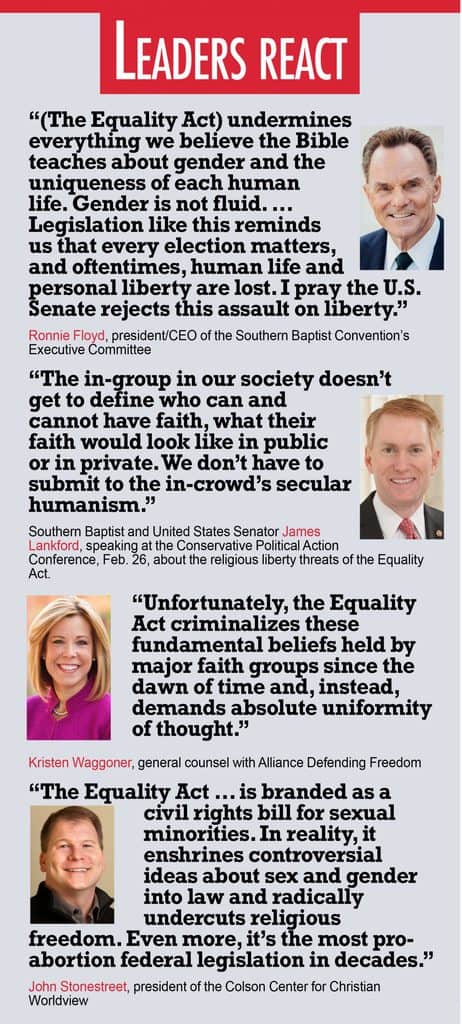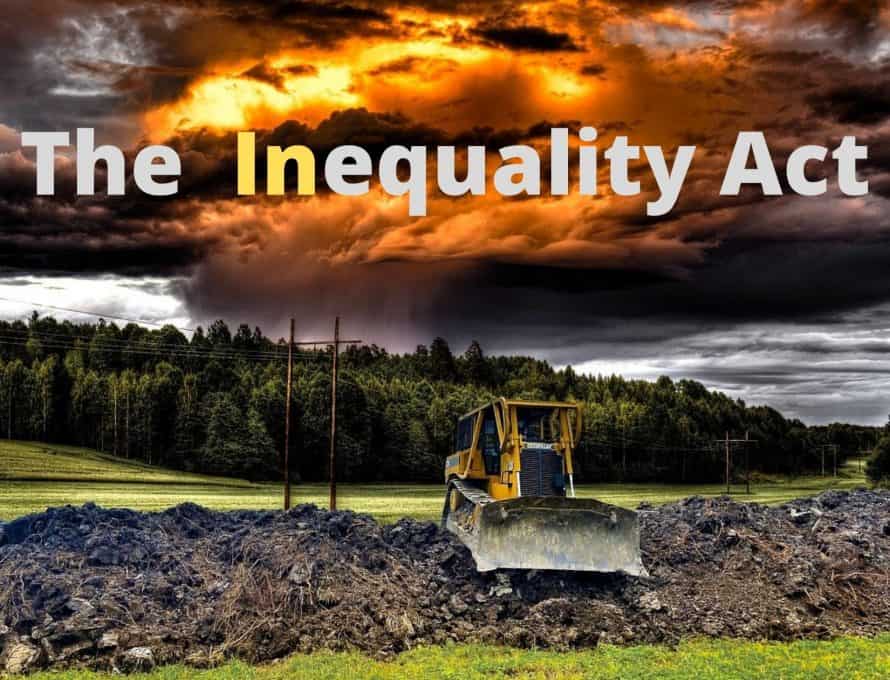WASHINGTON – Though the Equality Act may soon “put churches and religious groups in unprecedented territory,” Kansas City attorneys Michael and Jonathan Whitehead said Missouri Baptists don’t need to use much imagination to see what harm the bill could do.
The Whiteheads, father and son, have been involved in religious liberty cases at the U.S. Supreme Court, and they provide legal counsel for the Missouri Baptist Convention.

Mike Whitehead
The Equality Act (H.R. 5) passed through the U.S. House of Representatives, Feb. 25, and is now headed to the Senate. If passed and signed into law, the bill will redefine “sex” in the 1964 Civil Rights Act, “making sexual orientation and gender identity new protected classes in statutes banning discrimination in places of public accommodation, employment, housing, and by recipients of federal financial assistance.”
The results could be disastrous for churches and other religious groups, as well as men and women trying to live out their faith in the public square. In fact, according to the Whiteheads, the potential fallout of the Equality Act is already on display throughout the nation, since similar legislation has already passed at the local and state levels. Take, for example, the following possibilities:
• “In Massachusetts,” the Whiteheads said, “state officials declared that churches are subject to state public accommodation laws. That meant if churches host public activities – something as simple as a spaghetti supper – they would be forced to open women’s private changing areas and restrooms to biological men. If a church refused, it would face crippling fines and even jail time. Situations like this will multiply if the ‘Equality Act’ is imposed on the whole country.”
• Even now, a 200-year-old Catholic foster care ministry based in Philadelphia, Pa., is fighting for its existence in an ongoing U.S. Supreme Court case, simply because the ministry refuses to operate against biblical convictions by allowing foster children to be placed with same-sex couples. The case is Fulton, et al. v. City of Philadelphia.
“There is a national shortage of loving homes for our most needy children: those who have been neglected or abused and are now in state custody,” the Whiteheads told The Pathway. Yet government officials are driving away faith-based adoption providers because those officials dislike the providers’ religious beliefs about marriage. Purging these providers does not help a single child find a permanent home.”

Jonathan Whitehead
• Christian universities are likewise threatened by the bill. If these schools don’t follow the Equality Act’s mandates regarding LGBTQ discrimination, students could be cut off from federal tuition aid.
“That means any Christian university that has a code of conduct prohibiting sex outside of marriage or that declines to let biological males to compete on women’s sports teams could lose federal student aid,” the Whiteheads said. “While you might expect churches and Christian schools to be safe from such government overreach, experience tells us that this will not be the case if the ‘Equality Act’ is made law.”
• Additionally, the Equality Act drastically restricts the Religious Freedom Restoration Act (RFRA), removing religious liberty protections from Christians who want to run their businesses and operate in the public square according to their biblical convictions.
“Where RFRA tries to balance religious freedom and government interests,” the Whiteheads said, “the Equality Act bulldozes religious Americans out of the public square. It would prevent RFRA from applying to for-profit businesses operated by Christians, like Hobby Lobby or Jack Phillips’ Masterpiece Cakeshop.” Both of these businesses have been forced during the past decade to fight at the U.S. Supreme Court to uphold their biblical convictions.
“The bottom line is that our laws must respect freedom and promote justice for every citizen, no matter who they are,” they added. “But that is not what the ‘Equality Act’ does. Instead, it threatens Americans’ fundamental liberties. And that is something no American should stand for.”

Should Missouri Baptists oppose “Fairness for All”?
Amid debate regarding the Equality Act, some legislators and religious organizations have called for support of a compromise bill, called Fairness for All. Does this bill hold out any hopes for Americans who hold to a Christian worldview?
According to the Whiteheads, “Fairness for All is an attempt at compromise by some religious organizations who are willing to add sexual orientation and gender identity (SOGI) to the list of protected classes in exchange for narrow exemptions for religious organizations, at least for their ministerial positions. There would be no exemptions for religious persons like Jack Phillips’ Masterpiece Cakeshop, or the Green family and Hobby Lobby.
“Fairness for All will not provide fairness for all. It isn’t a good deal. It would make fledgling academic theories about gender and identity a permanent part of American law. In return, Fairness for All doesn’t protect religious people in their jobs or their kids in public schools. It only offers temporary protection to some religious institutions, and many of those are protections the First Amendment already offers.
“Plus, the compromise won’t appease the sexual revolutionaries, who will oppose any exemptions,” they added.
“There is no way to guarantee a future Congress wouldn’t take those protections away, just like the Equality Act tries to take away RFRA (the Religious Freedom Restoration Act of 1993).”

Owen Strachan
Owen Strachan, professor of systematic theology and director of the Center for Public Theology at Midwestern Baptist Theological Seminary, likewise opposes “Fairness for All.” In an article posted on Public Discourse in 2019, Strachan said the bill is “grounded in an unbiblical conception of the human person.” God’s Word, he said, “will not allow us to see any ungodly (sexual) ‘orientation’ or ‘identity’ as essential to our humanity, as directed toward our flourishing, and thus enshrined in law as a protected category.”
To read Strachan’s article, visit https://www.thepublicdiscourse.com/2019/09/56521/.
What’s the likelihood that the Equality Act will pass the Senate?
Though President Joe Biden has made the Equality Act a priority under his administration, the bill’s ability to clear the Senate is less obvious.
The Whiteheads told The Pathway, “Under the normal Senate rules, the Equality Act would fail in this Congress. But some Democrats are advocating that now is the time to change the Senate rules on cutting off debate and proceeding to a vote. Under the traditional rules, cutting off debate requires 60 votes. But with 51 votes, the Democrat Senate could abolish the ‘filibuster’ rule, so that debate could be cut off with 51 votes in the future, and then normal passage of most bills would require only a simple majority. The Left wing of the Democrat Party may believe the Equality Act is so important to their agenda that the time is right to abolish the 60-vote cloture rule to close debate. In that case, the Act could pass if even one Republican Senator changes their public position.
“Both Senator (Roy) Blunt and Senator (Josh) Hawley have publicly stated that they oppose the Equality Act. Missouri Baptists should thank them for taking that stand and should encourage them to maintain it steadfastly .
“But if the bill fails in 2021, I would expect it to return,” they added.
To learn more about the Equality Act, read the following stories:

